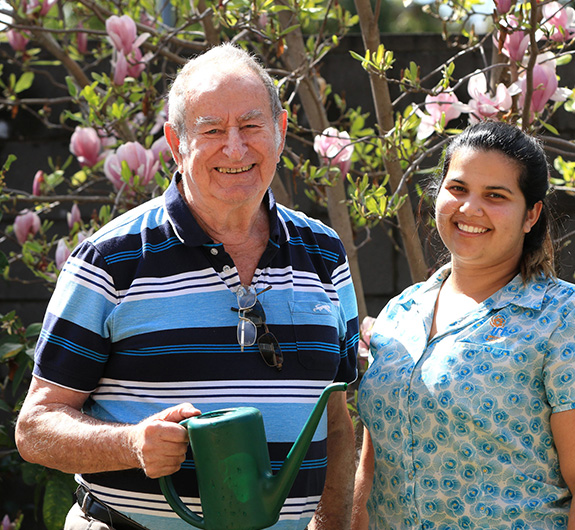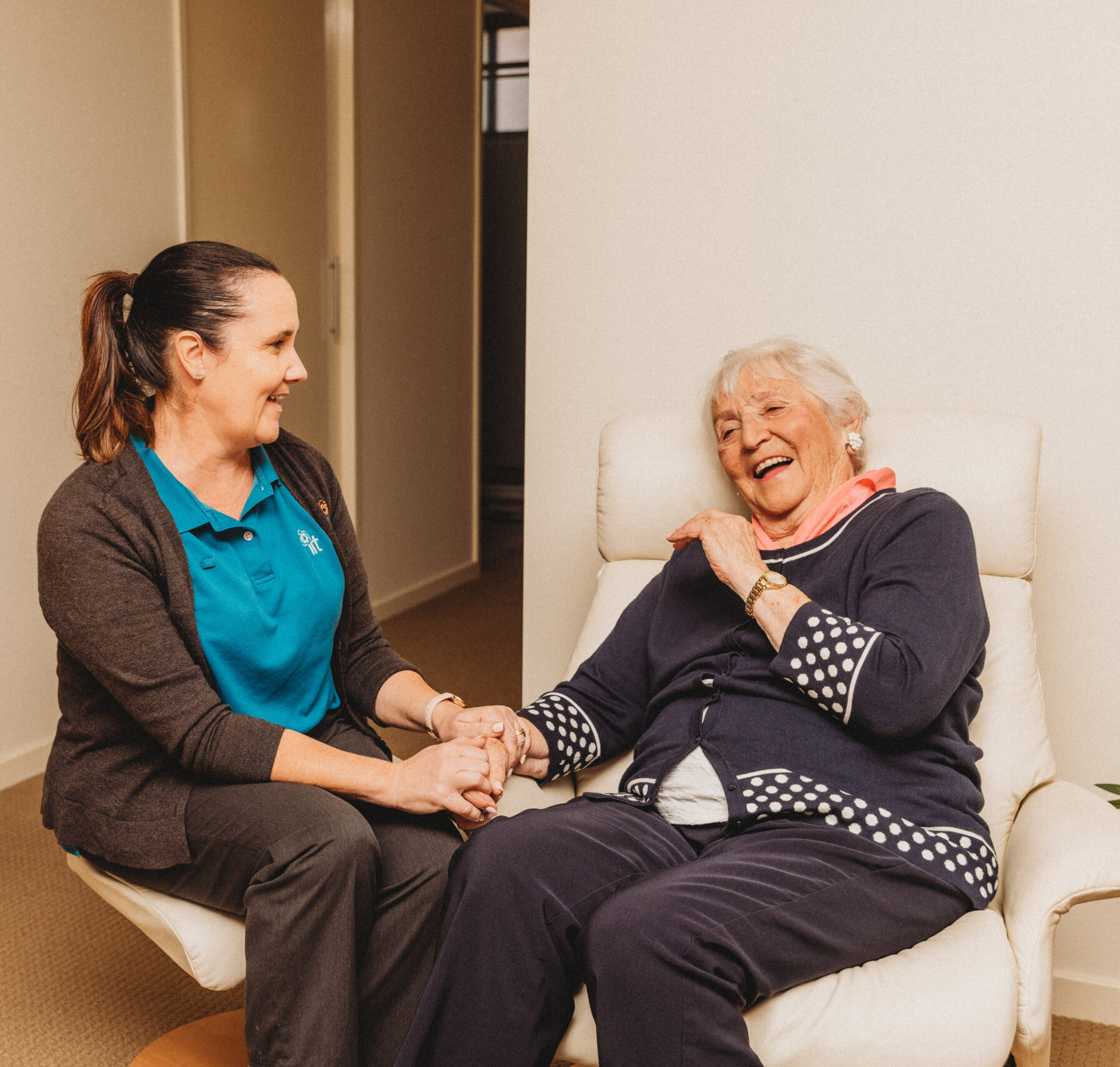How to take care of ageing parents
As our parents get older, even if they are completely independent, it’s possible they will need help with some tasks.

Sometimes some extra can help improve your parents' lifestyle without compromising their independence. However, it can also be difficult to determine what level of help is needed, and in turn help our parents make choices and decisions about their care.
So what can you do?
Having a practical and realistic plan will help, and talking with your parents to develop one, will also help you and them feel more confident in the current and future steps required to ensure their happiness and health.
1. Assess your parents’ needs
To start creating a plan, first, take a step back and talk to your parents about their needs and assess which ones are already being met and which ones they feel they might need help with. Obviously help to ensure their safety is a priority – if your ageing father who walks with a mobility aid is changing light globes by standing on a chair, then getting help with that is a safety priority.
There are eight key categories to look at:
- Support network
- Accessibility
- Medical needs
- Physical health
- Wellbeing
- Personal hygiene
- Nutrition
- Social interaction
Keeping an ongoing record or dated notes of their needs will help you track any changes and identify when you may require some extra support in certain areas. This record will also help when engaging with service providers as the discussion can be focused on immediate needs.
2. Assess your needs and abilities
If you decide to tread the path of looking after your ageing parents, it's also important to take care of yourself and your own health. At times you may experience frustration and exhaustion, so it's very important to take time for yourself. Be kind to yourself and considering options, like respite care (see short-term care below), can be a good way to get the right balance and help your mental health too.
Respite care, also known as short-term care, provides a temporary break for carers, families and adult children, allowing them to recharge while ensuring their loved one receives continuous support. At IRT we offer flexible options to suit your needs, providing respite care at home or at our residential aged care centres.
Learn how you can empower an older loved one in your life.
3. Take care of our own self-care
If you decide to tread the path of looking after your ageing parents, it's also important to take care of yourself and your own health. At times you may experience frustration and exhaustion, so it's very important to take time for yourself. Be kind to yourself and considering options, like respite care (see short-term care below), can be a good way to get the right balance and help your mental health too.
Respite care, also known as short-term care, provides a temporary break for carers, families and adult children, allowing them to recharge while ensuring their loved one receives continuous support. At IRT we offer flexible options to suit your needs, providing respite care at home or at our residential aged care centres.
Read more about respite care at IRT
4. Include your parent in the process
No one wants to feel their life is not within their control, which is no less true for older people. They have their own lives to lead and talking about their changing needs can be a difficult conversation for adult children and their parents.
Making changes to your parents’ lives may be met with resistance, as older adults who need help are often concerned about losing their independence.
Involve them in the decision-making process and start slowly with small changes to help them feel in control.
At IRT we want to make your aged care journey as easy and stress-free as possible, so we’ve put together a step-by-step guide to the ACAT process.

It’s not unusual for older Australians to call upon the family if they need help moving furniture or redecorating a room, but as our parents advance in years we might start noticing that some every-day tasks are becoming more challenging.
5. Consider the financial costs
Understanding the finances involved in caring for your parents should be a crucial step in your plan. Whether your parents are looked after by you or someone else, there will be costs involved.
Their living situation, food, medical costs, and more, will require budgeting consideration. You’ll need to evaluate what you and your parents can afford and compare it against what care they need. You might want to consider seeing a financial planner to better prepare for their care.
If considering assistance from an in-home aged care provider, the first step is to contact My Aged Care via their website or contact centre and arrange for the Aged Care Assessment Team (ACAT) to visit you and your parents at home. They will assess their needs and eligibility for government-funded services which can assist with the overall costs.
Planning ahead for this will help ensure they will continue receiving the care they need.
At IRT we want to make your aged care journey as easy and stress-free as possible, so we’ve put together a step-by-step guide to the ACAT process.
6. Determine accessibility needs
Our mobility decreases with age, and this can impact our daily activities. Simple tasks can become dangerous if not managed properly.
Minor injuries like slipping and falling may not be a big issue for someone younger, but it could result in something more serious for an older person. Making your elderly parents’ home more accessible can help ensure their safety and improve their chances of remaining independent for longer.
Simple accessibility modifications can include:
- Installing grab bars or handrails in the bathroom
- Installing small ramps between rooms where floor levels differ
- Ensuring frequently used items are within easy reach
- Ensuring lighting is adequate in all rooms.
Learn what you can do to help prevent falls from happening.
Learn what you can do to help prevent falls from happening.
7. Help them socialise
A healthy social life is vital for older adults as isolation and loneliness can seriously impact overall wellbeing and increase the risk of mental or physical illness.
There will undoubtedly be times when you or other friends and family can’t physically be there to visit them. So, in ensuring they have a working phone that is easy to use, consider pre-programing the numbers of friends and family into their phone. This will improve ease of use and increase reassurance that they can quickly contact you or others if they need to.
Another way to prevent loneliness is to research activities for seniors in their area and if your elderly parents have a suitable way of getting there and back. Local councils and libraries offer free or low-cost activities for seniors aimed at increasing meaningful connections and participating in engaging activities.
8. Use technology to stay connected with your parents
Technology, like mobile phone and tablets, are great communications tools and have plenty of functions and access to platforms which can help keep family members connected.
Creating a group chat for family members, where you can all share photos and stories, is a wonderful way to keep up with others, especially if they live in another town, city, state or country.
Video calling is also a great way to connect with people and have a face-to-face conversation, even if they are a long way away.
9. Decide on the best living situation
Caring for an elderly parent can be physically and emotionally overwhelming. Knowing your options ahead of time will ensure you meet your needs and those of your parents.
Seek professional home care services
A great starting point could be getting care services and support in the home, like in-home services, may help your parents stay at home longer, depending on the level of care they need. Services can include personal care through to getting out and about. In addition, in-home care can relieve family caregiver stress, making it easier for you to manage your own responsibilities and commitments.
Short-term care
Short-term care or respite care for when your elderly parents may need some extra support just for a while, or when you might need a break.
Residential aged care
Aged care centres for when your parents can no longer live at home independently, even with additional support and care.
The My Aged Care website of the Australian Government provides lots of information and resources to help inform your aged care journey.
10. At what age will my parents need care?
There is no hard and fast rule for when your elderly parents will need care and support. It depends on many factors including their general health, living situation, mental health, cognitive function, and their ability to do the things they want to do to live their best life.
11. Accept the situation; don't beat yourself up
Ageing is a reality we all face and every family's journey to find the best way to support their ageing parents is different. Learning about and researching care service options, connecting with caregiver support groups, investigating medical care, and speaking to a financial advisor, may all seem overwhelming but care service providers, like IRT, are here to support you and your family along the way.

IRT Aged Care Services
At IRT, we’ve been helping older Australians live their best lives for more than 50 years. We offer aged care centres and home care services in various locations across NSW, Qld and the ACT. As community providers with experienced and caring staff, you or your loved one will receive professional and compassionate care you can trust.
Find out moreYou may also like
What is Ageing in Place?
Ageing in place refers to continuing to live in the community, with some level of independence, rather than in residential aged care.
The benefits of living in a retirement village
Read about the benefits of retirement village life, including the lifestyle, community and health benefits.


